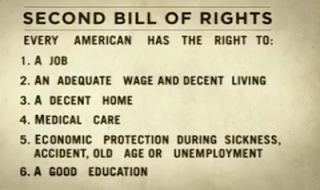The Second Bill of Rights, proposed by President Franklin D. Roosevelt during his State of the Union address in 1944, aimed to provide a series of economic rights to all Americans. By proposing constitutional amendments to enact these rights, it was implicitly acknowledged that the power to implement these policies did not exist within the current constitutional framework.
This blog will discuss the progress made towards adopting and implementing the Second Bill of Rights proposals without any constitutional amendments and highlight the dangers of ignoring the constitutional amendment process. We will conclude with a reminder of George Washington's warning on the importance of the constitutional amendment process.
The Second Bill of Rights and Ignoring the Constitutional Amendment Process
Roosevelt's Second Bill of Rights proposed a series of social and economic guarantees, such as the right to employment, education, housing, and healthcare. However, instead of seeking constitutional amendments to enact these rights, politicians have found ways to implement policies that align with the Second Bill of Rights goals without adhering to the proper constitutional process. This approach sets a dangerous precedent, undermining the Constitution's authority and allowing politicians to circumvent the rule of law.
Progress Without Constitutional Amendments: A Damning Example
Despite the lack of constitutional amendments, there has been substantial progress toward adopting and implementing some of the ideas put forth in the Second Bill of Rights. For example, the creation of social safety net programs such as Social Security, Medicare, and Medicaid, and the expansion of access to education through federal student aid programs, all work towards fulfilling the goals of Roosevelt's vision. However, these policies have been enacted without the proper constitutional authority, which is a concerning trend.
This pattern of usurpation is not limited to the Second Bill of Rights. Over time, politicians have found ways to expand their authority without seeking constitutional amendments, such as the gradual shift in war powers from Congress to the executive branch. By bypassing the constitutional amendment process, politicians undermine the Constitution and the democratic principles upon which the United States was founded.
As we reflect on the progress made towards realizing the Second Bill of Rights without any constitutional amendments, it is essential to remember George Washington's warning about the importance of the constitutional amendment process. Washington stated, "If, in the opinion of the people, the distribution or modification of the constitutional powers be in any particular wrong, let it be corrected by an amendment in the way the Constitution designates. But let there be no change by usurpation; for though this may be the instrument of good in one instance, it is the customary weapon by which free governments are destroyed."
This wise counsel serves as a reminder that the process of amending the Constitution is critical in preserving the democratic principles of the United States. It emphasizes that any significant change should be accomplished through the proper channels, reflecting the people's will and upholding the rule of law.
Conclusion
The Second Bill of Rights serves as a cautionary tale of the dangers of ignoring the constitutional amendment process. The methods by which the policies were enacted are concerning, as they bypass the proper constitutional channels. As we continue to work towards the realization of the goals set forth in the Second Bill of Rights, we must remember George Washington's warning and remain vigilant in upholding the principles and procedures enshrined in our Constitution. To preserve our democratic system, we must resist the temptation to circumvent the Constitution and adhere to the rule of law.
